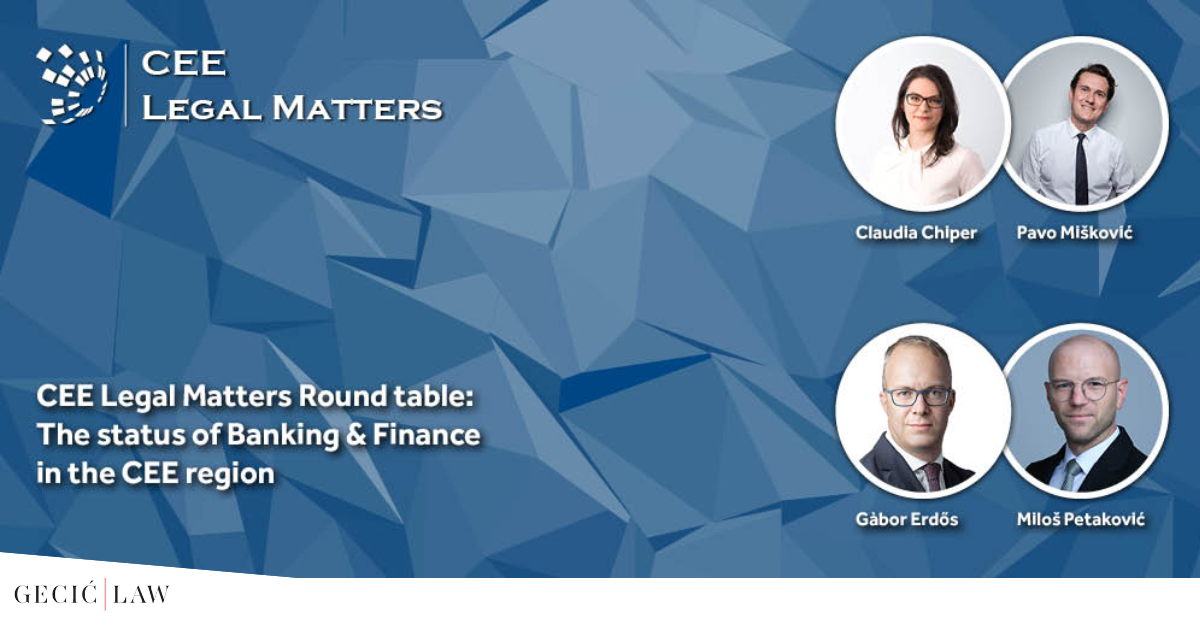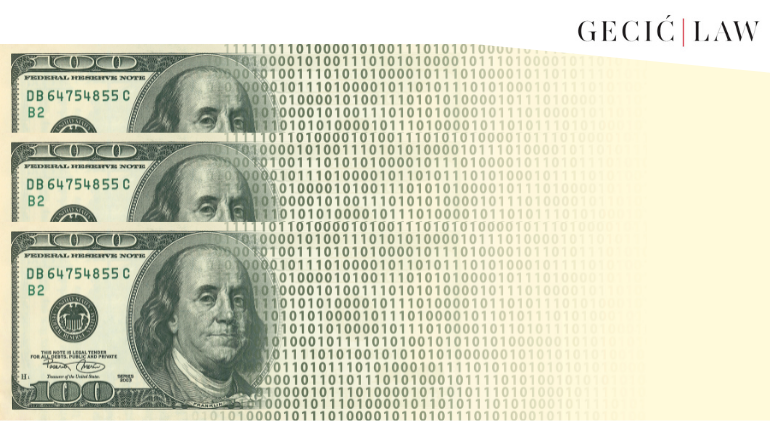

Gecić Law proudly presents the latest edition of our ESG Chat @ Gecić Law series, we are focusing on the intersection of Environmental, Social, and Governance (ESG) issues within the banking and finance sector. In this interview, we delve deep into the insights and perspectives of a distinguished ESG and CSR expert in Serbia, Sonja Konakov Svirčev, Corporate Social Responsibility, Diversity and Inclusion Manager at Erste Bank Serbia. Our guest expert shares their extensive knowledge of the role and significance of social responsibility within the broader ESG framework. She also emphasizes the strategic importance of socially responsible and sustainable business […]
Details
What are Green and other related ESG corporate bonds? Green bonds, a prominent term in finance, have recently gained significant attention. These instruments, part of the broader Environmental, Social, and Governance (ESG) category, offer distinct advantages over regular bonds and play a crucial role in modern finance. Like regular bonds, ESG bonds involve loans from investors to organizations. These loans finance projects, and investors receive their principal back with interest. ESG bonds include green, social, climate, and sustainability-linked types. Green bonds, issued by public or private entities, finance environmental or climate change projects. They represent the environmental aspect of ESG. […]
Details
An (Un)expected Oligopoly At the end of October, the Belgian Competition Authority (L’Autorité belge de la Concurrence) (“ABC”) released an opinion on the state of competition in Belgium’s retail banking market (the “Opinion”). The Opinion revealed that the retail banking market in Belgium is an oligopoly. Four banks dominate the market: BNP Paribas Fortis, KBC, Belfius, and ING. As an oligopoly, the retail banking market exhibits specific characteristics. These include similar services on offer and frequent interactions between banks, facilitating coordination among the most prominent market participants and reducing competition. The most obvious example of services with identical commercial terms […]
Details
Gecić Law is proud to announce that it has contributed to the inaugural edition of the Terralex Cross-Border Guide to ESG and Sustainable Finance for the jurisdictions of Montenegro and Serbia. We are especially thrilled that our team was honored to contribute with its expertise and complete the section of the guide that refers to the entire EU. The guides are now live and are free to access. This confirms our team’s pioneering expertise in one of the hottest fields of law today. The EU chapter, authored by counsel Branko Gabrić and associates Nikola Ivković, Milica Novaković, Teodora Ristić, Marko […]
Details
The energy crisis and rising costs are not the primary driver but have certainly accelerated discussions on energy sustainability. Responsible companies and real estate developers are already implementing construction strategies that enable energy sustainability and qualify for certificates such are LEED and BREEM. As the market is turning greener, real estate developers are motivated to do so: it increases the demand, secures financing, and provides an overall better company image. But what about old buildings? Either built before there was awareness of the need for energy savings or just losing the battle with time, old buildings maintain energy spillage, which […]
Details
Amendments to the Tax Procedures and Tax Administration Act (“Act“) were adopted and entered into force on December 20, 2022. The following is a reminder of the most significant changes you should keep an eye on. (Non)postponement of the enforcement procedure The legislator removed paragraph 6 from Article 77 of the Act through the amendments. This article stipulated that the Tax Administration would only initiate compulsory enforcement after a decision had been made on a taxpayer’s request to postpone tax payment. This move implies that the Tax Administration may, without restrictions, initiate enforcement proceedings even though a request for tax deferment has […]
Details
Our Senior Associate Miloš Petaković took part in a round table on the Status of Banking and Finance in the CEE Region recently organized by the preeminent regional legal publication CEE Legal Matters, joined by colleagues from eminent law firms throughout the region. Miloš drew from his substantial experience in the sector and explained the current situation in Serbia with the industry’s numerous changes. Among other things, Miloš said: “Serbia is in a similar situation to most of the (CEE) markets – the majority of banks are EU-based and are part of the bigger EU banking groups. Still, we do have banks […]
Details
At today’s session, the Executive Board of the NBS decided to again raise key interest rates by 50 basis points, to 3.5% ,, the deposit facility rate – to 2.5% and the credit facility rate – to 4.5%. The NBS had previously increased the key interest rate as per the decision of the Executive Board on August 11, this year. The NBS’s Executive Board continued to tighten the monetary policy.,attributing this trend to increasingly rising inflationary pressure. According to the NBS, the Executive Board assessed that, in the conditions of continued price pressures, as well as the growth of imported […]
Details
As we discussed last week, the National Bank of Serbia (“NBS”) decided to hike the interest rate to 3%. In addition to this decision, several other measures were introduced aimed at reducing the growing inflationary pressures affecting the economy of Serbia. One of the measures is the decision that all banks that have increased their fees for payment services since January 1, 2021, will reduce those fees by 30% starting September 1 or reduce these fees prior levels. According to the NBS, the aggregate benefit of this measure to individual clients will amount to 7 billion dinars. In addition, NBS […]
Details
The Executive Board of Serbia’s Central Bank (“NBS”) voted today to raise key interest rates by 25 basis points to 3%, in a fifth hike this year. The credit facility rate is now 4% and the deposit facility rate is 2%, all increased by 25 basis points. The Executive Board decided that an additional tightening of the monetary policy is necessary, and that year-on-year inflation is expected to peak during the current quarter and then start declining. In conditions of continued cost pressures and growth of imported inflation beyond all expectations, the NBS is aiming for a balanced approach that […]
Details
The US Federal Reserve published a document titled Money and Payments: The U.S. Dollar in the Age of Digital Transformation (“Paper”) in January. The Paper points out the pros and cons of creating the digital dollar in the form of a CBDC (Central Bank Digital Currency), to determine whether it could improve the US payment system. As we explained in earlier texts on this subject, CBDCs are virtual records of existing fiat currencies. They represent the complete equivalents of currencies such as the euro, dollar, dinar, etc. The Paper points out that the digital dollar would be a liability of […]
Details
Environmental awareness has been a pressing topic for decades. In the past, international treaties were signed to put words into action. One of these key treaties was the 1997 Kyoto Protocol. The reasoning behind this protocol was evident; countries needed to reduce greenhouse gas emissions (“GHG”). Back in 2008, Serbia had ratified this agreement and prescribed mandatory targets for the reduction of harmful emissions in the period between 2008-2012. The Amendment from Doha confirmed the second binding period of the Kyoto Protocol, between 2013-2020, including new obligations in GHG emissions reduction. However, perhaps the most crucial treaty was the Paris […]
Details
Technological development influenced capital markets far more than expected in the last decade. Decentralized currencies, central bank digital currencies and digital tokens are all huge news in the world of finance. And so are stablecoins. What are stablecoins and how do they “work”? Stablecoins are a unique kind of decentralized digital assets, developed to “bring the best of both worlds”. They have all the characteristics of decentralized currencies but also solve the problems of volatility and uncertainty. That makes them similar to centralized currencies. Stablecoins are unique because they are backed by real reserves. They are either backed by fiat […]
Details
Does blockchain technology carry risks of money laundering and terrorist financing? The Financial Action Task Force (“FATF”) responds affirmatively. In October 2021, FATF published an Updated Guidance for a Risk-Based Approach (“Guidance”), as a result of crypto market monitoring. The Guidance is based on the assessment of the risk of money laundering and terrorist financing regarding the regulation and supervision of virtual assets (“VA“) and Virtual Assets Service Providers (“VASP“). The amendments to the Guidance are the result of the FATF’s ongoing work and oversight of the VA and VASP sectors and their development, to prevent money laundering and terrorist […]
Details
This year will bring big changes, at least when it comes to financial markets. Namely, 2021 is when the long-awaited abolition of LIBOR will take place. Although there was a lot of talk about technical obstacles that need to be overcome, change was seemingly inevitable. LIBOR (London Interbank Offered Rate) is the daily reference interest rate at which banks lend to each other on the interbank market. It gained in importance in the 1990s, when the British Banking Association (“BBA”) settled relevant standards of regulation, the collection and analysis of data obtained, which will serve as a basis for calculating […]
Details
The National Bank of Serbia is making inroads into harmonizing local legislation with European Union (“EU”) legislation, especially into amending regulations governing the operation of banks and other financial institutions. The European Commission (“EC”) adopted a decision of importance for the Republic of Serbia, which was published on 18 December 2019 in the Official Journal of the EU. Serbia’s push to amend the regulatory and supervisory framework concerning banks’ operations and in particular to amend anti-money laundering and terrorist financing regulation has borne fruit and is a step in the right direction for building a stable financial system. This decision […]
Details
Gecić Law is delighted to announce yet another commendation by The Legal 500 EMEA, one of the most eminent and prestigious directories of the legal world. Our Banking & Finance practice continues its bullish run to the national top. Its head Nikola Aksić was named to the guide’s “Leading Individuals” elite list of outstanding lawyers in the country, only one year after being recommended by the guide. The practice also went up in the overall rankings, securing a Tier 2 recognition. And we haven’t stopped there. Our Corporate/M&A practice is not lagging behind. The practice head Ognjen Colić […]
Details
In line with the action plan included in the non-performing loan resolution strategy (“NPL Strategy”), the Serbian Parliament passed amendments to the Voluntary Financial Restructuring Act (“the Act”) on 23 October 2015. The law entered into force on 4 November 2015 and will be enforced as of 2 February 2016. Pending financial restructurings will continue in line with the provisions of the Act. The changes the Act introduces may not be monumental, but legislators expect they will contribute to developing a more favorable economic environment in the country. It remains to be seen how the Act is going to be […]
Details
On October 1, 2015, the new Payment Services Act came into force. This new piece of legislation introduced numerous and rather important changes to the Serbian payment operations system. These changes are also a part of Serbia’s harmonization with European Union laws and business practices, which presumes liberalization of payment services provision and widening of authorized service providers in this field, other than the National Bank of Serbia (NBS) and licensed banks, will have a significant positive impact on the market efficiency. One of the most significant changes in this sense introduced in the Payment Services Act relates to the formation of a […]
Details